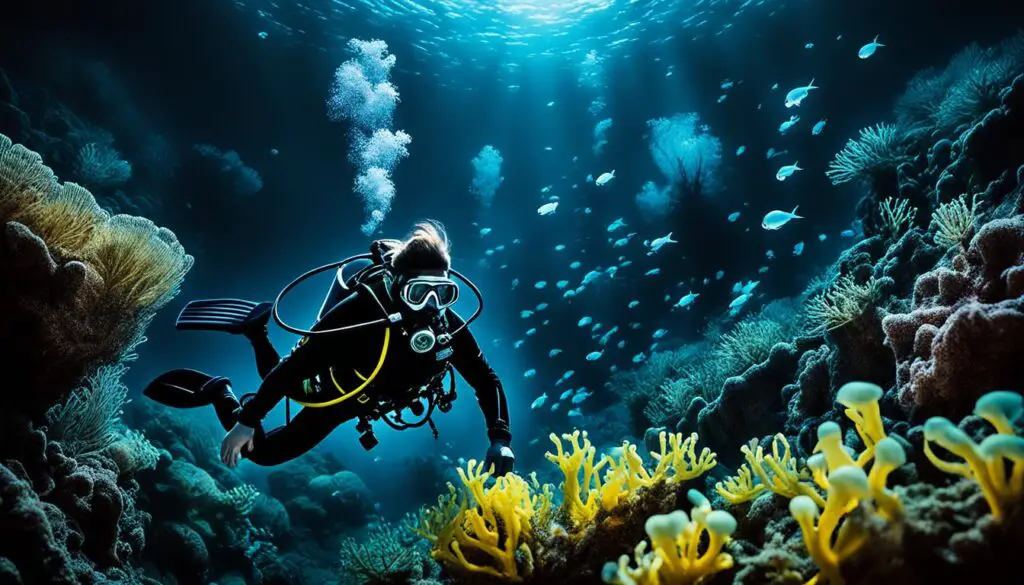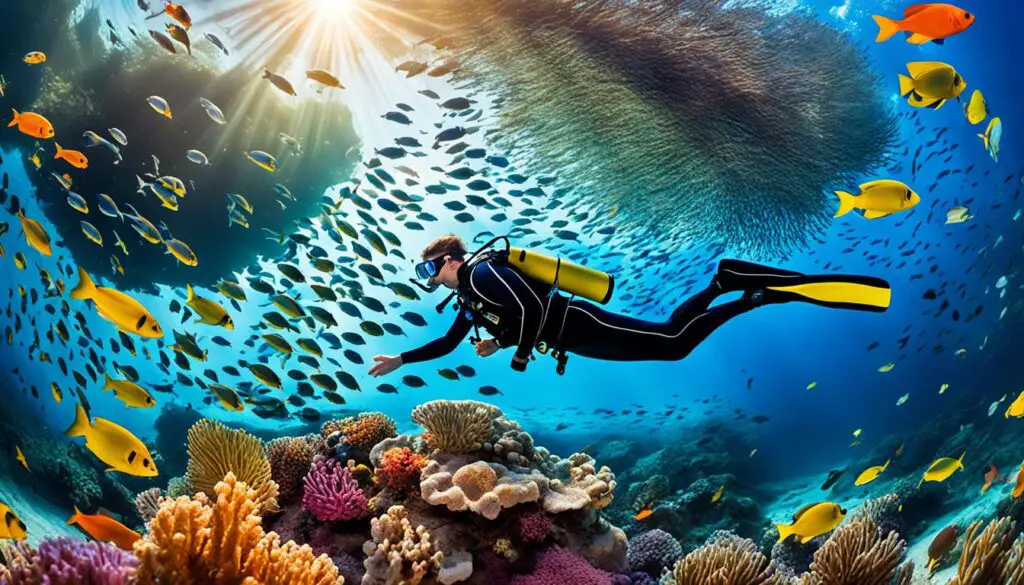When it comes to underwater adventures, few activities evoke as much excitement and fascination as deep sea diving and scuba diving. Both offer unique opportunities to explore the mysterious depths of the ocean, but they are not one and the same. To truly appreciate the world beneath the surface, it’s crucial to understand the differences between the two.
Deep sea diving takes us into the abyss, where we venture beyond the recreational limits of scuba diving. This thrilling activity involves descending to depths typically exceeding 100 feet. It requires specialized equipment, extensive training, and professional certifications. Deep sea diving is often conducted by experienced divers or scientists exploring the wonders and mysteries hidden in the darkest corners of the underwater world.
On the other hand, scuba diving is a recreational activity that allows individuals to delve into the shallower waters of the ocean. With the aid of self-contained underwater breathing apparatus (SCUBA), divers can explore the vibrant coral reefs, encounter fascinating marine life, and even explore the mysteries of sunken shipwrecks. Basic scuba training and certification are required, but it is accessible to most people with a passion for underwater exploration.
Whether you are drawn to the depths of the ocean or prefer the allure of the shallow waters, understanding the distinction between deep sea diving and scuba diving is fundamental in embarking on thrilling underwater adventures.
Key Takeaways:
- Deep sea diving explores depths beyond recreational scuba diving limits.
- It requires specialized equipment, training, and certifications.
- Scuba diving is a recreational activity that allows individuals to explore the shallower depths of the ocean.
- It involves using self-contained underwater breathing apparatus (SCUBA).
- Understanding the differences between the two is vital for anyone interested in underwater adventures.
Deep Sea Diving: Delving into the Abyss
Deep sea diving is a thrilling and high-risk activity that allows adventurers to explore the mysterious depths of the ocean. It involves descending into the abyssal depths, far beyond the reach of natural light. The excitement and challenge of deep sea diving attract professional divers who are trained to handle the extreme conditions that exist in this underwater realm.
At such depths, specialized equipment is crucial to ensure the diver’s safety and enable underwater exploration. One such equipment is the atmospheric diving suit (ADS), which provides life support and protection against the immense pressure of the deep sea. These suits, often made of strong and durable materials, allow divers to withstand the extreme conditions and ensure their survival in this hostile environment.
Deep sea diving serves a variety of purposes, from scientific research and exploration to commercial activities like oil rig maintenance and underwater construction. Professional divers working in these fields undergo rigorous training to hone their skills and develop the expertise required to navigate the complexities of the deep ocean. Their knowledge and experience enable them to conduct underwater missions safely and efficiently.
“Exploring the depths of the ocean is an awe-inspiring experience. It takes courage, skill, and deep knowledge of the underwater world. Deep sea divers are the unsung heroes who venture into the abyss to uncover the secrets hidden beneath the surface.”
Deep sea diving opens up a whole new world of discovery, where the wonders of the ocean unveil themselves to those who dare to explore. It offers a unique opportunity for scientific advancements, fueling breakthroughs in understanding marine life, geological formations, and the impact of human activity on the underwater ecosystem.
As we delve deeper into the ocean’s abyss, we uncover new species, encounter breathtaking geological structures, and observe firsthand the delicate balance of life below the surface. Deep sea diving continues to push the boundaries of human exploration and knowledge, unlocking the mysteries that lie beneath.
“In the depths of the ocean lies an enchanting world waiting to be explored. With every dive, we reveal the hidden treasures of the deep, expanding our understanding of the vast underwater realm.”

| Benefits of Deep Sea Diving | Challenges of Deep Sea Diving |
|---|---|
| Opportunity for scientific research and exploration | High-risk activity requiring specialized training |
| Discovery of new species and geological formations | Extreme underwater conditions and immense pressure |
| Contribution to understanding the underwater ecosystem | Dependence on advanced equipment and technology |
| Exploration of uncharted territories | Limited visibility and potential disorientation |
Scuba Diving: Exploring the Shallow Waters
Scuba diving is a popular recreational activity that allows individuals to explore the underwater world in the shallower depths of the ocean. With the help of SCUBA equipment, divers can breathe underwater and stay submerged for extended periods. Scuba diving is accessible to most people after completing basic dive certification.
There are various levels of certification, ranging from entry-level open water diver to advanced or specialty certifications. Each certification level provides divers with the necessary skills and knowledge to safely navigate and explore underwater environments.
Scuba divers have the opportunity to experience the beauty of coral reefs, explore sunken shipwrecks, and encounter a wide range of marine life up close. The underwater world is a mesmerizing and vibrant ecosystem, filled with colorful fish, intriguing creatures, and stunning underwater landscapes.
One of the most popular scuba diving destinations is the Great Barrier Reef in Australia. This UNESCO World Heritage Site offers divers the chance to explore one of the most diverse and breathtaking underwater ecosystems on the planet.
Scuba diving is not only an exciting recreational activity but also a way to contribute to marine conservation efforts. Many divers participate in underwater clean-up initiatives, coral restoration projects, and scientific research programs to help protect and preserve our oceans.
Whether you’re a beginner or an experienced diver, scuba diving provides a thrilling and rewarding experience for those who have a passion for the ocean and its inhabitants.
The Benefits of Scuba Diving:
- Opportunity to explore the underwater world
- Encounter diverse marine life
- Experience the beauty of coral reefs
- Discover sunken shipwrecks
- Contribute to marine conservation efforts
SCUBA Equipment:
SCUBA stands for Self-Contained Underwater Breathing Apparatus. It is the equipment that allows divers to breathe underwater.
The key components of SCUBA equipment include:
- Mask: Covers the diver’s eyes and nose, allowing them to see clearly underwater and equalize pressure.
- Regulator: Controls the flow of air from the SCUBA tank to the diver’s mouthpiece.
- BCD (Buoyancy Control Device): Allows divers to control their buoyancy and stay at a desired depth.
- Wetsuit or Drysuit: Provides thermal insulation and protects divers from the cold water.
- Fins: Aid in swimming and maneuvering underwater.
To ensure a safe and enjoyable scuba diving experience, it’s important to choose properly fitting and well-maintained SCUBA equipment and have it regularly inspected by a professional.
Quote:
“Scuba diving allows me to escape into a surreal underwater world where I can explore, discover, and be in awe of nature’s wonders.” – Jane Smith, Experienced Scuba Diver

Conclusion
Deep sea diving and scuba diving are both incredible ways to explore the underwater world. Each activity offers unique opportunities for underwater adventures and allows individuals to witness the breathtaking beauty that lies beneath the ocean’s surface.
While deep sea diving requires specialized training and equipment, it provides divers with the chance to explore depths beyond recreational scuba diving limits. It is a high-risk activity often undertaken by professional divers and scientists to conduct research or engage in commercial activities such as underwater construction. Deep sea diving unlocks the mysteries of the deep and allows for groundbreaking discoveries.
On the other hand, scuba diving offers a more accessible and recreational approach to underwater exploration. With proper training and certification, individuals can embark on thrilling scuba diving adventures. Whether it’s exploring vibrant coral reefs, discovering sunken shipwrecks, or encountering fascinating marine life, scuba diving provides an up-close and personal experience with the ocean’s wonders. It is an activity that can be enjoyed by divers of various skill levels, making it a popular choice for recreational divers worldwide.
While deep sea diving and scuba diving differ in their depths, required training, and purposes, both activities share a common goal – to immerse individuals in the beauty and awe-inspiring nature of the underwater world. Whether you choose to venture into the abyssal depths or explore the shallower waters, the thrill and wonder of underwater adventures await those who dare to dive into the unknown.
FAQ
What is the difference between deep sea diving and scuba diving?
Deep sea diving involves exploring depths beyond recreational scuba diving limits, typically more than 100 feet deep. It requires specialized equipment, training, and certifications, and is usually conducted by professional divers or scientists. Scuba diving, on the other hand, is a recreational activity that allows divers to explore the shallower depths of the ocean using self-contained underwater breathing apparatus (SCUBA).
What are the risks and requirements of deep sea diving?
Deep sea diving is a high-risk activity that requires advanced skills, training, and specialized equipment. It involves descending into the abyssal depths of the ocean, often going beyond the reach of natural light. Deep sea divers use advanced diving suits, known as atmospheric diving suits (ADS), or manned submersibles to withstand the extreme pressures and conditions found at these depths. Professional deep sea divers undergo rigorous training to ensure their safety and to navigate the complexities of exploring the deep ocean.
How can I start scuba diving?
Scuba diving is a popular recreational activity that is accessible to most people after completing basic training and certification. There are various levels of certification, ranging from entry-level open water diver to advanced or specialty certifications. After obtaining certification, divers can experience the beauty of coral reefs, explore sunken shipwrecks, and encounter marine life up close.
What can I expect to see while scuba diving?
While scuba diving, you can expect to see a breathtaking array of marine life, including colorful coral reefs, tropical fish, sea turtles, and even larger creatures like sharks or dolphins. Exploring sunken shipwrecks can also be a thrilling experience, allowing you to glimpse into the past and discover history beneath the waves.
Is deep sea diving or scuba diving more suitable for me?
The choice between deep sea diving and scuba diving depends on your preferences, experience, and comfort level. If you are seeking a high-risk, specialized diving experience that requires advanced skills and training, deep sea diving may be for you. However, if you are looking for a recreational activity that allows you to explore the beauty of the ocean in a more accessible manner, scuba diving would be a better choice.
